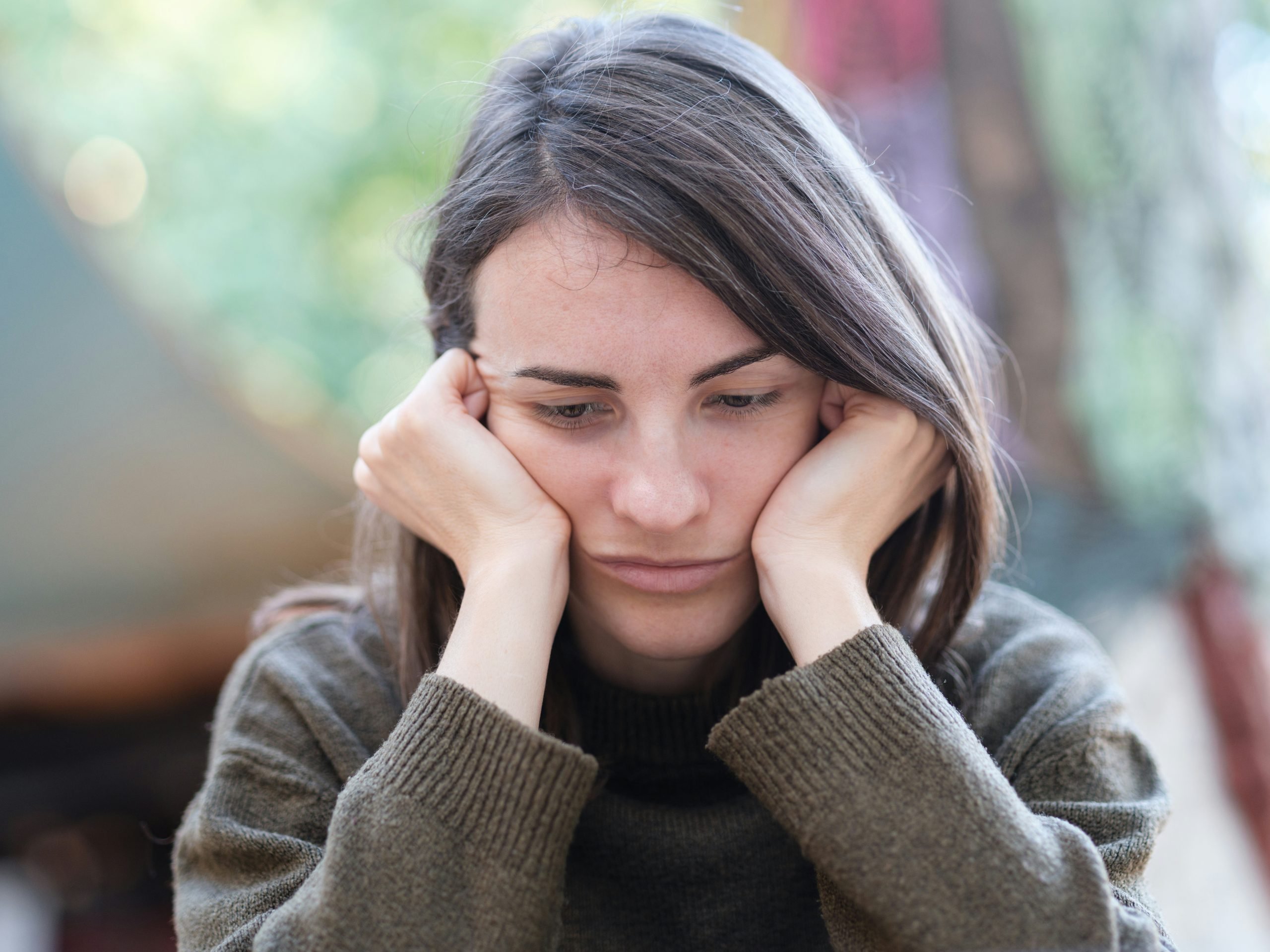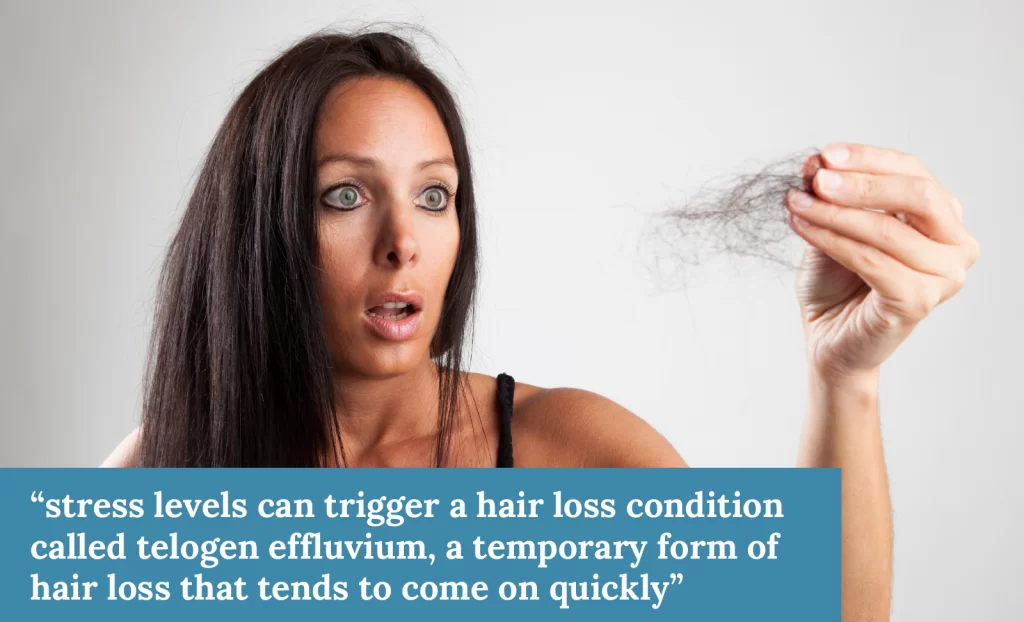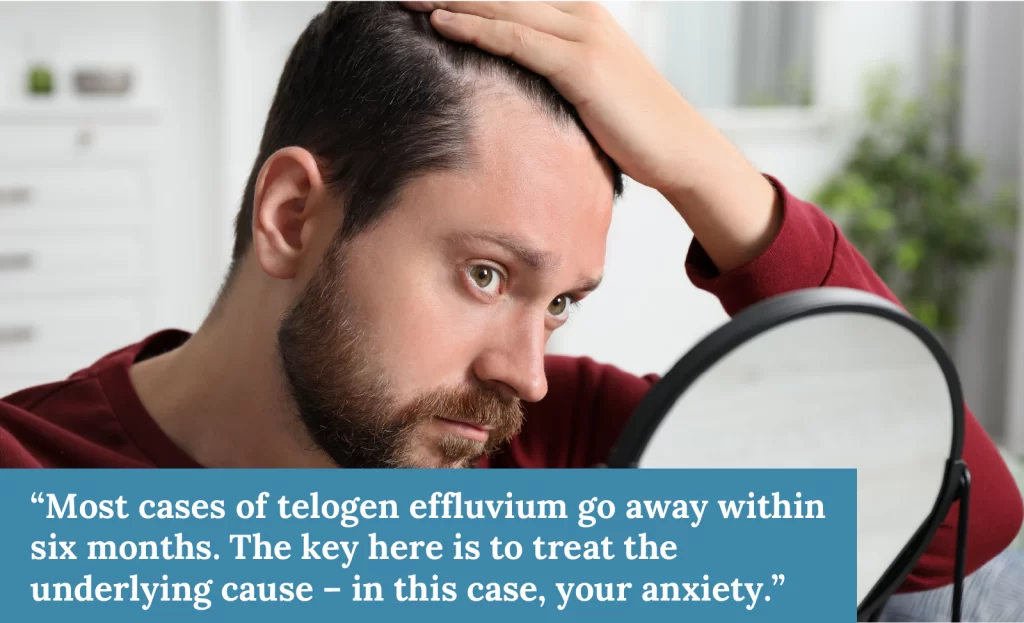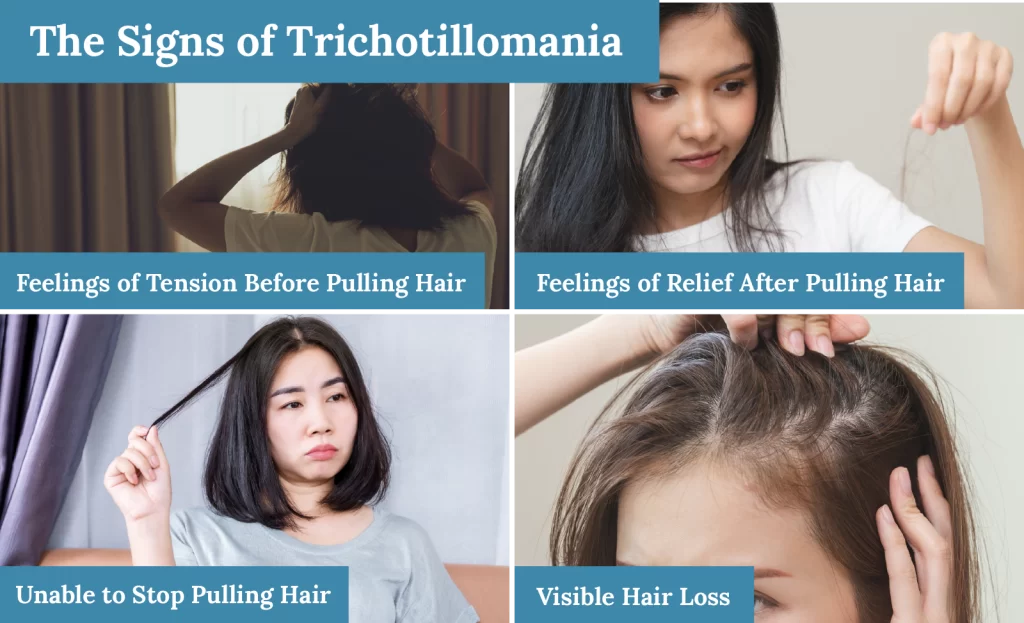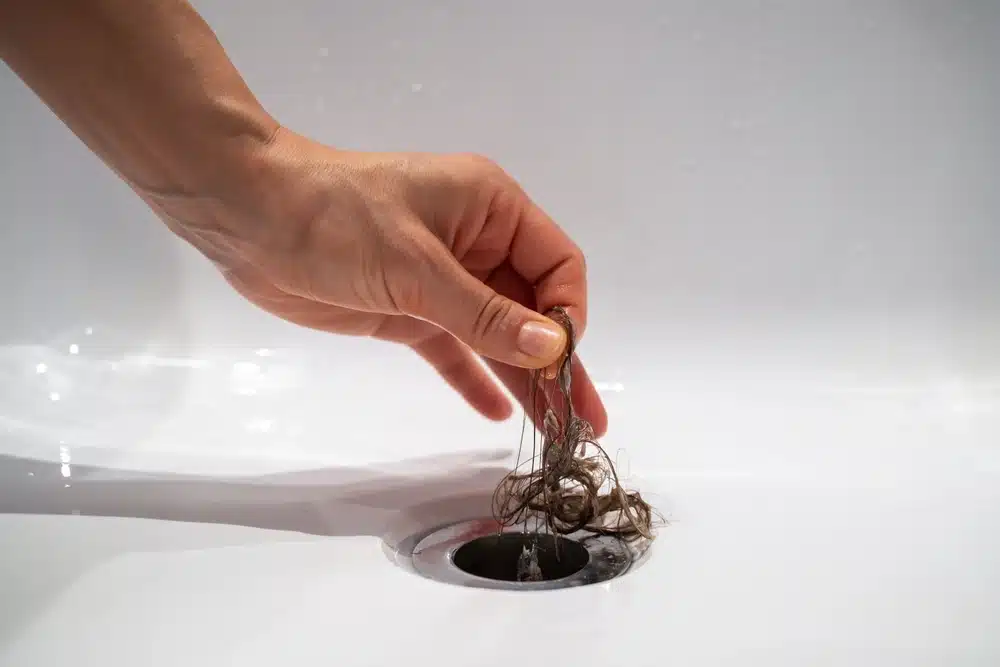Discovering that you are losing your hair is never easy. You may have gone through your whole life enjoying a full head of hair, only to one day realise your strands are thinner than usual, or that you have balding patches. It’s tough, as there are social implications, and it can wreak havoc on your self-esteem.
In this situation, the best step is to understand what’s causing the hair loss. Of course, there are several potential culprits here. Could one of them be your anxiety – can anxiety make you lose hair?
Can Anxiety Cause Hair Loss?
So, does stress and anxiety cause hair loss? Yes. The reason for this is the high-stress levels you encounter when experiencing anxiety. These stress levels can trigger a hair loss condition called telogen effluvium, a temporary form of hair loss that tends to come on quickly.
There are also other ways anxiety can cause hair loss, including alopecia areata and trichotillomania. Now that we’ve answered, “Does anxiety make you lose hair?” we’ll go into the whys below.
About Telogen Effluvium
This is the most common cause of stress-induced hair loss. Telogen effluvium is a form of rapid hair loss that occurs when there’s a sudden influx of stress to your body, which disrupts the hair growth cycle. [1] When this happens, the hairs leave the growth phase and enter the telogen phase (also known as the resting phase), which is when the hair begins to shed. This means more hairs are shed prematurely, causing significant hair loss.
There are many different triggers for telogen effluvium, and high levels of stress and anxiety are one of them. The good news is that telogen effluvium is a temporary type of hair loss, although it can be recurring if a person has chronic stress.
The Signs of Telogen Effluvium
If you want to know if your hair loss is caused by stress-induced telogen effluvium, these are the signs:
- Sudden Hair Shedding
- Thinning Hair
- Dry Hairs that Fall Out
- Finding Hairs on Pillow and in Shower Drain
Treatments for Telogen Effluvium
Most cases of telogen effluvium go away within six months. The key here is to treat the underlying cause – in this case, your anxiety. We’ll go into treating anxiety disorders further below.
You can also use over-the-counter medications for hair loss such as minoxidil, to speed up regrowth, which works by stimulating the hair follicles.
About Alopecia Areata
Alopecia areata is an autoimmune system. Those with alopecia areata have immune systems that attack healthy hair follicles, which prevents the follicles from being able to grow new hairs, leading to hair loss. [2]
Stress isn’t necessary for alopecia areata to affect a person, but it can trigger the response of hair loss.
The Signs of Alopecia Areata:
- Coin-Sized Patches of Hair Loss
- Beard, Eyebrow, and/or Eyelash Loss
- A Tingling Sensation
If you experience these, you should consult with a healthcare professional for a proper diagnosis.
Treating Alopecia Areata
Unfortunately, there is no cure for alopecia areata. However, there are helpful hair loss remedies that can manage symptoms and help individuals regrow their hair, including:
- Topical Corticosteroids
- Steroid Injections
- Minoxidil (both topical and oral)
- Phototherapy
- JAK Inhibitors
About Trichotillomania
Trichotillomania, also known as hair pulling disorder, is a mental health condition that gives an individual an uncontrollable urge to pull out their own hair, whether hair from their scalp, eyebrows, or eyelashes. Often, people develop trichotillomania as a way to deal with negative emotions, including stress and anxiety.
Over time, this frequent hair pulling can lead to significant hair loss, which often looks uneven.
The Signs of Trichotillomania
- Feelings of Tension Before Pulling Hair
- Feelings of Relief After Pulling Hair
- Wanting to Stop Pulling but Being Unable To
- Visible Hair Loss
- Embarrassment About Hair Pulling (including attempts to cover the hair loss)
Trichotillomania Treatments
Trichotillomania is a complex mental health condition that requires professional medical assistance. Some treatments include:
- Habit Reversal Training
- Cognitive Behavioural Therapy (CBT)
- Hypnotherapy
- SSRIs
- Memantine
- Attending Support Groups
Treating the Underlying Condition of Anxiety
There’s no denying that the answer to, “Can anxiety cause hair loss?” is yes, even if it’s indirectly. That is just one of the many reasons to treat anxiety – not only can it help you regrow your hair, but it will also have a positive impact on your life as a whole. So, before looking into a good hair loss treatment, consider the following ways to treat anxiety first.
Therapies
One of the most effective ways to treat anxiety is through therapy. There are various forms of therapy that can be useful, including behavioural therapies like CBT, which helps individuals restructure their thought patterns, behaviours, and coping strategies. Other therapies like group therapy and counselling sessions can also be helpful.
Medications
Those with anxiety disorders can benefit from medications prescribed by doctors. SSRIs are a type of antidepressants that helps patients create more serotonin in the brain, which can help manage the symptoms of anxiety. Other medications may include beta-blockers and benzodiazepines.
Self-Help
While it’s always a good idea to seek treatment options for anxiety at a doctor’s office, you can also help treat anxiety yourself. Some lifestyle changes are very effective here, such as exercising more regularly, eating a healthy diet, getting enough sunshine, and connecting with others socially. Then there are relaxation techniques to reduce anxiety, such as breathing exercises and meditation.
If anxiety and stress are taking over your life, it’s essential to seek help from a medical professional to help get it under control.
Treating Hair Loss
After wondering ‘Can anxiety cause hair loss?’, you may next want to know how to treat the hair loss. We’ve covered treating the underlying cause of anxiety, but there are also ways to stimulate new growth that can be very effective.
Hair Loss Medications
Two popular hair loss medications to treat hair loss include minoxidil and finasteride.
Minoxidil is a medication that usually comes in topical form. It is applied directly to the scalp once or twice per day and works by stimulating more blood flow to the hair follicles, encouraging new growth. It’s important to keep up with using minoxidil for the results to continue.
Finasteride is usually an oral medication, and one you can only get via a prescription. It is usually used to treat prostate problems, but works for hair loss by inhibiting the production of DHT, a hormone that can cause hair loss in men. Like with minoxidil, it requires continued use of the medication for results to stick.
If you want to track how well these medications help your hair growth, a hair track app is useful.
Clinical Treatments
There are many clinical treatments that treat various types of hair loss. One is PRP (platelet-rich plasma) therapy, which involves injecting blood platelets into the scalp to encourage new growth, which is effective due to the growth factors contained in the platelets. Another is low-level laser therapy, a non-invasive treatment that targets the scalp with low-level lasers to stimulate the follicles.
Home Remedies
You can even treat hair loss from the comfort of your home – although, this is best for minimal signs of hair loss, as significant hair loss should lead you to a hair specialist or healthcare professional.
Home remedies include hair oils like rosemary oil, pumpkin seed oil, and castor oil. You can also stimulate the follicles from home by giving yourself a head massage, which pumps more blood to the scalp. Plus, if struggling with anxiety, a head massage can be very relaxing.
What About a Hair Transplant?
After you experience hair loss, you may wonder, can you get a hair transplant? FUE hair transplants are particularly effective as they take individual follicles from a donor area and transplant them to an area that has balding/thinning. Once these follicles take root, they start to grow brand new hairs, allowing a full head of hair in the patient.
Whether you can get a hair transplant depends on the cause of hair loss. For example, hair transplants are typically not recommended for those with telogen effluvium, as the hair is likely to grow back anyway. Most hair transplants work best for those with androgenetic alopecia only. However, you can get in touch with our clinic to see the options for you.
Can Anxiety Cause Hair Loss? The Key Points to Remember
So, can anxiety cause hair loss? The answer is yes – it can. These are the key points to keep in mind.
- Anxiety/Stress and Hair Loss are Linked
- High Anxiety Levels Can Trigger Telogen Effluvium, Alopecia Areata, or Trichotillomania
- Telogen Effluvium is a Temporary Form of Stress-Induced Hair Loss
- Alopecia Areata is a Chronic Autoimmune Condition
- It’s Best to Treat the Underlying Anxiety to Also Treat Hair Loss
Have you experienced hair loss and want an effective solution? Let the team here at Harley Street Hair Clinic guide you through a process that can leave you with a full head of healthy hair once more. Get in touch or head to our patients gallery to see the results we provide patients.
Sources:
- https://my.clevelandclinic.org/health/diseases/24486-telogen-effluvium
- https://www.niams.nih.gov/health-topics/alopecia-areata#:~:text=Overview%20of%20Alopecia%20Areata,be%20more%20extensive%20and%20progressive.
